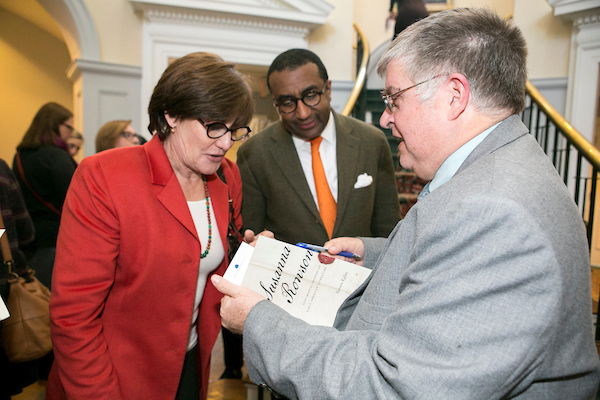https://www.youtube.com/watch?v=3Pr588EytPU

Samford University political science and philosophy alumnus Eric Motley ’96 hosted a reception at Samford Feb. 3 to honor English professor Steven Epley. “Dr. Epley was my freshman English professor in 1992, and over the years, he has continued to be a strong pillar in my life,” said Motley, currently serving as executive vice president and corporate secretary at The Aspen Institute. “It is one of those beautiful and meaningful teacher-student relationships that seem to be rare in most places, save Samford.”
Student and teacher reunited, in part, to celebrate Epley’s new book, Susanna Rowson: Sentimental Prophet of Early American Literature (Northwestern University Press). In addition to hosting the reception, Motley provided gift copies of the book for attendees.
Epley’s book grew from a longtime interest in Rowson (1762–1824,) a playwright, actress, novelist, poet and educator. He first read Rowson’s Charlotte Temple—“America's first best-selling novel”—as a graduate student, and found in the author’s life elements of his own family’s history. “My mother was in the early stages of Alzheimer’s, and it was hard to be hundreds of miles away and unable to help my sister care for her,” Epley said. “Because I was thinking so much about my mom, and still missing my father, who had died years earlier, I formed an intense, if entirely one-sided, bond with Rowson, whose story reminded me in many ways of both of theirs.”
“Like my dad, who grew up in hardscrabble frontier Arkansas with six younger siblings to raise virtually single-handedly once his mother died, Rowson cared for her distressed family when they were put under house arrest in the Revolutionary War,” Epley said. “Like my mom, Rowson had to battle the discrimination faced by women in her time.” Epley’s mother, whose father discouraged her from attending college, raised three teenaged children after the death of Epley’s father. “Rowson’s success as a writer and teacher represented for me a kind of surrogate wish-fulfillment fantasy related to what I think my own mother could have accomplished,” he said.
Epley also finds in Rowson’s works a unique use of religion to address sexism, racism and inequality. “Her responses to vexing early American social issues are shaped by notions of righteousness, justice, covenant accountability, mutual obligation, and personal loyalty drawn from the Old Testament, especially the prophets,” Epley said. He finds in Charlotte Temple “a modern retelling of Israel’s history.” In the novel Reuben and Rachel, he finds a warning to a young America that it will suffer if it denies the rights of women.
“I believe that Rowson identified with themes of exile and deliverance because of her nearly three-year-long adolescent trauma of house arrest with her family,” Epley said, “which takes me back to the connection that I see between her and my own parents.”
Follow Howard College of Arts and Sciences on Facebook and Twitter.
